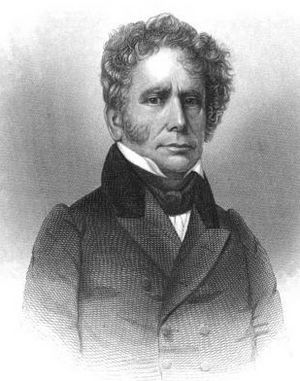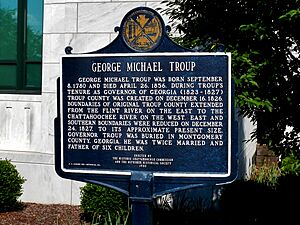George Troup facts for kids
Quick facts for kids
George McIntosh Troup
|
|
|---|---|
 |
|
| United States Senator from Georgia |
|
| In office March 4, 1829 – November 8, 1833 |
|
| Preceded by | Oliver H. Prince |
| Succeeded by | John P. King |
| In office November 13, 1816 – September 23, 1818 |
|
| Preceded by | William W. Bibb |
| Succeeded by | John Forsyth |
| 32nd Governor of Georgia | |
| In office November 7, 1823 – November 7, 1827 |
|
| Preceded by | John Clark |
| Succeeded by | John Forsyth |
| Member of the U.S. House of Representatives from Georgia's At-large district |
|
| In office March 4, 1807 – March 3, 1815 |
|
| Preceded by | David Meriwether |
| Succeeded by | Wilson Lumpkin |
| Member of the Georgia General Assembly | |
| In office 1803-1805 |
|
| Personal details | |
| Born | September 8, 1780 McIntosh Bluff, Alabama |
| Died | April 26, 1856 (aged 75) Treutlen County, Georgia |
| Political party | Democratic-Republican, Democratic |
| Spouses | Anne St. Clair McCormick Anne Carter |
| Alma mater | College of New Jersey |
George McIntosh Troup (September 8, 1780 – April 26, 1856) was an important American politician from the state of Georgia. He served in several government roles, including the Georgia General Assembly, the U.S. House of Representatives, and the U.S. Senate. He also became the 32nd Governor of Georgia for two terms. Troup believed in expanding the United States and supported policies that led to the removal of Native American tribes from their lands.
Contents
Early Life and Family Connections
George Troup was born in 1780 during the American Revolution. His birthplace was McIntosh Bluff, which is now in Alabama, but was part of Georgia at the time. His parents were George Troup and Catherine McIntosh. Catherine was the daughter of Captain John McIntosh, a British military officer and a leader of the McIntosh clan. She was also a cousin to the Creek Chief Alexander McGillivray and an aunt to Creek Chief William McIntosh.
Troup was married twice and had six children. He mostly lived in Dublin in Laurens County. His large farm, called a plantation, was named Valdosta. This name came from the Valle d'Aosta alpine valley in Italy. Later, the town of Valdosta, Georgia was named after Troup's plantation. Another town, Troupville, Georgia, was also named in his honor.
George Troup went to the College of New Jersey (which is now Princeton University) and graduated in 1797. After college, he studied law and became a lawyer in Savannah, Georgia, two years later.
Starting a Political Career
Troup began his career in politics. He strongly opposed the Yazoo land scandal, which was a major land fraud issue in Georgia. He was a member of the Democratic-Republican Party. From 1803 to 1805, Troup served one term as a state legislator in Georgia.
In 1806, he was elected to the U.S. House of Representatives. He served there from 1807 to 1815. During this time, Troup was part of a group of politicians known as the "War Hawks." These members of Congress, including Henry Clay and John C. Calhoun, strongly supported the United States entering the War of 1812. Troup was later elected to the U.S. Senate. There, he was supported by other wealthy plantation owners and became the chairman of the Senate Committee of Military Affairs.
Serving as Governor of Georgia
In 1819, a powerful Georgia politician named William H. Crawford chose Troup to run for governor. However, Troup lost twice to Crawford's rival, John Clark. In 1823, Troup ran again and won, as Clark could no longer run.
As governor, Troup supported the idea of moving the Creek Indians from western Georgia. He wanted them to move to the Western Territory, an idea first suggested by Thomas Jefferson. In 1825, Troup won re-election by a very small number of votes.
On February 12, 1825, Troup signed the Treaty of Indian Springs with his cousin, William McIntosh, a Creek chief. This treaty gave a large part of Georgia's land to the state. However, many Creek leaders did not agree with this treaty. Troup even challenged President John Quincy Adams and threatened to use force if federal troops tried to stop him from taking the remaining Creek land in Georgia. The President eventually allowed Troup to proceed.
During his time as governor, Troup also supported public education and the building of new roads and canals. He believed that the United States should have a good relationship with Great Britain, calling them "our cousins" and a "sister nation." He thought the two countries might even reunite someday. However, he was very critical of France and its government.
Later Political Life
After his second term as governor ended, Troup returned to the Senate in 1829. He was a Jacksonian Democrat and served on the Committee on Indian Affairs. In 1852, he was nominated for President of the United States at a convention in Jackson, Mississippi.
Death and Legacy
George Troup passed away on April 26, 1856, while visiting one of his plantations near the Oconee River in what is now Treutlen County, Georgia. He was buried at the Rosemont plantation.
Troup County was created in 1826 from land that used to belong to the Lower Creek tribe, and it was named in his honor. During the American Civil War, an Athens, Georgia battery (a group of cannons) was named the "Troup Artillery" to remember him.

See also
- Hofwyl-Broadfield Plantation, owned by his brother
 | Jessica Watkins |
 | Robert Henry Lawrence Jr. |
 | Mae Jemison |
 | Sian Proctor |
 | Guion Bluford |

